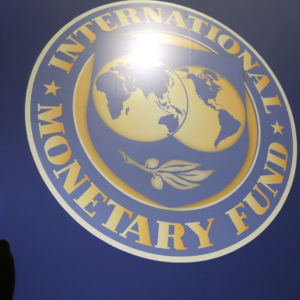At a press conference in Washington on Thursday, the International Monetary Fund (IMF) affirmed its opposition to policies that discriminate against foreign investors when it was asked about a dispute in Iceland.
Iceland has completely turned itself around nearly a decade after a severe economic collapse. The economy has strengthened, and it’s now growing faster than many other major countries. The government, however, faces criticism over a policy that discriminates against foreigners who invested in Icelandic assets.
The government implemented capital controls after the 2008 financial crisis in an emergency move to help stabilize its economy. In deciding to exit the capital controls last year, the government then passed a law which gave a subset of the country’s investors, called offshore krona holders, two choices: they could sell their bonds to the government at a steeply discounted exchange rate or have their funds locked in low-interest bank accounts.
Iceland’s exit of capital controls was well received by the IMF initially. The IMF has established metrics for countries exiting capital controls that require maintaining a specific level of reserves. When the restrictions on foreign investors first passed in mid-2016, news outlets cited the IMF’s approval for Iceland’s policy against offshore krona holders as an essential part of its broader capital controls liberalization plan. But the IMF brought into question its support for Iceland’s restrictions on foreign investors during its news conference Thursday.
“I’m not familiar with those statements from the Iceland authorities nor the details of the issue so maybe we can come back to you after the briefing on that if we have anything,” IMF Communications Director Gerry Rice said at a press conference when asked by InsideSources. “In general, no, we do not support those kinds of restrictions.”
The IMF Articles of Agreement forbid discrimination against investors on the basis of nationality. The IMF was less steadfast in a report from last year. The report said the restrictions were enforced effectively but warned against prolonged use. The report didn’t outright condone or condemn the plan despite stating that it was implemented effectively.
“Staff urged a comprehensive plan be developed to guide capital account liberalization for residents,” the IMF report stated. “Capital controls have been enforced exceptionally effectively. Their prolonged use, however, is increasingly amplifying distortions.”
Foreign investors were left with no choice except to accept less on their investments even though the economy is growing. The Organisation for Economic Co-operation and Development (OECD) reported the economy is now on the upswing putting the policy in question.
“Economic growth is strong with continued expansion in tourism, robust private consumption and favourable terms of trade,” OECD stated in an economic outlook last year. “Steep wage gains, employment expansion and large investments are fuelling domestic demand. The capital controls introduced during the financial crisis are being lifted.”
The goal of the restrictions was to keep assets from fleeing the country, but some argue the country has the growth to keep their commitments to investors. An op-ed by former State Department official James Glassman last month stated the country could easily allow all the foreign bondholders to exit by trading in their bonds at a fair exchange rate.
Some critics see the policies as far worse than just a lousy exchange rate. The Economist reported that a group of foreign investors accused the country of essentially defaulting on its debts. The European Free-Trade Association Surveillance Authority has already received complaints to that extent from frustrated fund managers.
The Central Bank of Iceland’s Monetary Policy Committee is forecasting the country will see further economic gains. Its quarterly economic outlook Wednesday revealed the country is expected to experience a six percent growth in its gross domestic product (GDP) over the next year. Despite Iceland’s claim that it must continue its policy of discrimination against foreign investors, the committee noted that it sees no need to continue building foreign exchange reserves.
Iceland now has new leadership which will likely play a role in where the dispute goes from here. New Prime Minister Bjarni Benediktsson has yet to reveal how he might move forward. Iceland Watch notes the previous government seized on the opportunity to vilify foreign investors, but the new government now has an opportunity to turn that relationship around.

